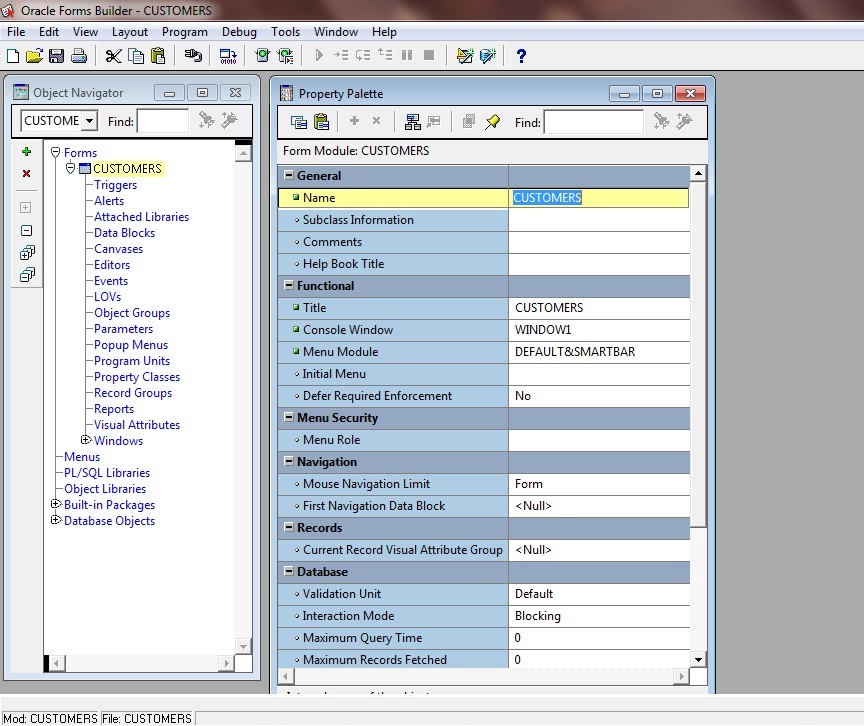System variables in Oracle Forms 6i are built-in variables that store values related to the form’s runtime environment. These variables help developers manage the behavior of forms, control navigation, and retrieve useful information.

Categories of System Variables
System variables in Oracle Forms 6i can be categorized into the following types:
- Form-Level Information
- Navigation and Block Handling
- User and Database Information
- Message and Error Handling
- Runtime and Environment Information
1. Form-Level Information System Variables
These variables provide information about the form, module, or records.
| System Variable | Description | Example |
|---|---|---|
| :SYSTEM.CURRENT_FORM | Returns the name of the current form. | MESSAGE(:SYSTEM.CURRENT_FORM); |
| :SYSTEM.CURRENT_BLOCK | Returns the name of the current block. | MESSAGE(:SYSTEM.CURRENT_BLOCK); |
| :SYSTEM.CURRENT_ITEM | Returns the name of the current item (including block name). | MESSAGE(:SYSTEM.CURRENT_ITEM); |
| :SYSTEM.CURRENT_RECORD | Returns the number of the current record in the block. | MESSAGE(:SYSTEM.CURRENT_RECORD); |
🔹 Use Case:
- If you want to check which form the user is currently working on, you can use:plsqlCopyEdit
IF :SYSTEM.CURRENT_FORM = 'EMP_FORM' THEN MESSAGE('You are in Employee Form'); END IF; - If you want to get the name of the active block:plCopyEdit
MESSAGE('Current Block: ' || :SYSTEM.CURRENT_BLOCK);
2. Navigation and Block Handling System Variables
These variables help track navigation inside the form.
| System Variable | Description | Example |
|---|---|---|
| :SYSTEM.LAST_FORM | Returns the last accessed form. | MESSAGE(:SYSTEM.LAST_FORM); |
| :SYSTEM.LAST_RECORD | Returns the last visited record in a block. | MESSAGE(:SYSTEM.LAST_RECORD); |
| :SYSTEM.LAST_BLOCK | Returns the last accessed block. | MESSAGE(:SYSTEM.LAST_BLOCK); |
| :SYSTEM.LAST_ITEM | Returns the last visited item. | MESSAGE(:SYSTEM.LAST_ITEM); |
🔹 Use Case:
- If you want to prevent the user from moving back to the last item:plsqlCopyEdit
IF :SYSTEM.LAST_ITEM = 'EMPLOYEE.SALARY' THEN MESSAGE('You cannot return to Salary field.'); END IF; - If you want to check if the user is at the last record:plsqlCopyEdit
IF :SYSTEM.LAST_RECORD = :SYSTEM.CURRENT_RECORD THEN MESSAGE('This is the last record.'); END IF;
3. User and Database Information
These variables return details about the current user session.
| System Variable | Description | Example |
|---|---|---|
| :SYSTEM.USERNAME | Returns the database user name. | MESSAGE(:SYSTEM.USERNAME); |
| :SYSTEM.FORM_STATUS | Checks the form status (CHANGED, QUERY, etc.). |
MESSAGE(:SYSTEM.FORM_STATUS); |
| :SYSTEM.COORDINATE | Returns the X, Y coordinates of the cursor. | MESSAGE(:SYSTEM.COORDINATE); |
| :SYSTEM.OPERATOR_ID | Returns the ID of the connected user. | MESSAGE(:SYSTEM.OPERATOR_ID); |
🔹 Use Case:
- If you want to check if the current form has unsaved changes before closing:plCopyEdit
IF :SYSTEM.FORM_STATUS = 'CHANGED' THEN MESSAGE('Please save your changes before exiting.'); END IF; - If you want to log the database user:plsqlCopyEdit
INSERT INTO USER_LOGS (USER_NAME, LOGIN_TIME) VALUES (:SYSTEM.USERNAME, SYSDATE);
4. Message and Error Handling
These variables help manage form errors and messages.
| System Variable | Description | Example |
|---|---|---|
| :SYSTEM.MESSAGE_LEVEL | Controls the level of displayed messages. | :SYSTEM.MESSAGE_LEVEL := 25; |
| :SYSTEM.LAST_ERROR | Returns the last error number. | MESSAGE(:SYSTEM.LAST_ERROR); |
| :SYSTEM.LAST_ERROR_TEXT | Returns the last error message. | MESSAGE(:SYSTEM.LAST_ERROR_TEXT); |
🔹 Use Case:
- If you want to suppress non-critical messages:plCopyEdit
:SYSTEM.MESSAGE_LEVEL := 25; -- Suppresses non-critical messages - If you want to log errors when an exception occurs:plsqlCopyEdit
EXCEPTION WHEN OTHERS THEN INSERT INTO ERROR_LOGS (ERROR_CODE, ERROR_MESSAGE) VALUES (:SYSTEM.LAST_ERROR, :SYSTEM.LAST_ERROR_TEXT);
5. Runtime and Environment Information
These variables help track environment settings.
| System Variable | Description | Example |
|---|---|---|
| :SYSTEM.CURSOR_BLOCK | Returns the block where the cursor is placed. | MESSAGE(:SYSTEM.CURSOR_BLOCK); |
| :SYSTEM.CURSOR_ITEM | Returns the item where the cursor is placed. | MESSAGE(:SYSTEM.CURSOR_ITEM); |
| :SYSTEM.CURSOR_RECORD | Returns the record number where the cursor is placed. | MESSAGE(:SYSTEM.CURSOR_RECORD); |
| :SYSTEM.MODE | Returns the current mode (ENTER-QUERY, NORMAL, etc.). |
MESSAGE(:SYSTEM.MODE); |
🔹 Use Case:
- If you want to restrict a certain operation when in query mode:plCopyEdit
IF :SYSTEM.MODE = 'ENTER-QUERY' THEN MESSAGE('Cannot perform this action in query mode.'); RAISE FORM_TRIGGER_FAILURE; END IF;
Summary & Memory Trick to Remember System Variables
Here’s a simple trick to remember the categories of system variables:
📝 F.U.N.M.E. (Form, User, Navigation, Message, Environment)
- F → Form-Level Variables (
CURRENT_FORM,CURRENT_BLOCK) - U → User & Database Info (
USERNAME,FORM_STATUS) - N → Navigation Handling (
LAST_ITEM,LAST_RECORD) - M → Message & Error Handling (
LAST_ERROR,MESSAGE_LEVEL) - E → Environment & Runtime (
CURSOR_ITEM,MODE)
If you remember F.U.N.M.E., you can quickly recall the system variables.
Conclusion
System variables in Oracle Forms 6i provide powerful control over form behavior. By mastering these, you can create more responsive and efficient applications. Always test system variables in various scenarios to fully understand their impact.
Would you like me to provide a PDF or an interactive Oracle Forms demo using system variables? 🚀

